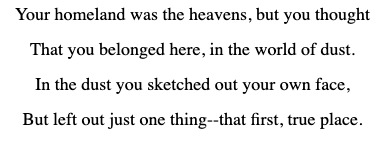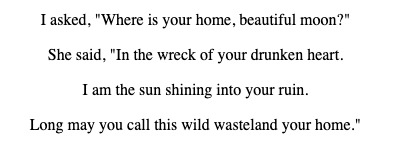#Translated by Zara Houshmand
Note
Hello! I've been looking for some inspiration, and I was hoping one of you might be able to lend a hand. My uncle and his partner are getting married in September after having been together as long as I can remember, because they are worried if they don't marry now we will lose marriage equality in the US. It's dark times for sure. My uncle asked me to read something at their ceremony though. I've been trying to find a quote/short story/poem by a queer author that captures the love they feel for each other and I feel for them as well as the seriousness of the times we live in. If anything comes to mind, I'd appreciate any input! Thanks
I am so sorry you are feeling that kind of anxiety, and I hope that these small passages do something to ease it. They are some of my favourites.
"When mankind gathers on that final day
And faces pale from fear of reckoning,
I'll hold your love in the palm of my hand,
And I will say, 'By this I'm saved or damned.'"
By Jalāl ad-Dīn Muhammad Rūmī
Translated by Zara Houshmand
"We two boys together clinging,
One the other never leaving,
Up and down the roads going, North and South excursions
making,
Power enjoying, elbows stretching, fingers clutching,
Arm'd and fearless, eating, drinking, sleeping, loving,
No law less than ourselves owning, sailing, soldiering, thieving,
threatening,
Misers, menials, priests alarming, air breathing, water drinking, on
the turf or the sea-beach dancing,
Cities wrenching, ease scorning, statutes mocking, feebleness chasing,
Fulfilling our foray."
Walt Whitman
"We live in poison. The planet is dying. We can choose to consume each other, or we can choose love. Even in the midst of despair, there is always a choice. I hope we choose love.”
Kai Cheng Thom
Please add more in the notes!
#queer history#lgbt history#gay history#queer#lgbt#answered#lesbian history#transgender history#transgender#making queer history
501 notes
·
View notes
Text
i stumbled across a Rumi quatrain on tumblr today and it reminded me to go looking for my favourites, so here's a few, all taken from Kulliyat-e Shams-e Tabrizi, with the caveat that i do not speak Farsi and I have read them all as translations only. more notes on translation at the end, but all of these are translated by Zara Houshmand, and taken from the archives of The Iranian.

#1771

#57

#1584

#1316
and the note on translation: these are of course not the Coleman Barks translations, the most popular English translations. i think the orientalism and... de-Sufi-fying and de-Muslim-ifying of the Barks translations and a lot of English-language and Western perception of Rumi is much more discussed now (Jawid Mojaddedi, who is writing a translation of Rumi's multi-volume Masnavi, says, "The Rumi that people love is very beautiful in English, and the price you pay is to cut the culture and religion.") if you're interested, Persian Poetics has a great twitter thread about it and their website has text, audio, and video resources where they've talked about it. and this article from Ajam Media is a short read and an interesting comparison of a few different translations.
if you enjoy Zara Houshmand's translations, she has a book of translations of Rumi's quatrains, Moon and Sun. there's many translations of Rumi's works not by Barks, that prioritise different things: you can 100% find a translation that isn't Barks, and Rumi's work is. so beautiful and so much better when you are not reading whatever uhhh... interpretation Barks came up with.
#image description in alt#poetry#text post#my post#fun fact in the same article i linked barks is quoted as saying#'the Qur'an is hard to read'#(yes i have changed the transliteration to Qur'an from the quote bc i'm sorry but i refuse to type it that way)#1 that's fucking bonkers to say as someone who has 'translated' Rumi's work like how are you openly admitting to that#and 2 the Masnavi quotes extensively from the Qur'an???#anyway i cannot begin to describe the shock i felt when i first came across 1 Rumi quatrains in the original Farsi where you can. physicall#see how much is missing from Barks' translation (and can identify common themes in those words if you can read any Arabic script)#and 2 when i read other translations for the first time and realised how much both God-as-figure and Islamic and Sufi tradition and#philosophy was missing#i was genuinely upset#it's... idk#when you are feeling that strange and deep ache and joy of love that is always mixed with the deep ache and joy of faith or God or etc#you gotta turn to Rumi yknow i need to remember that more often#i also haven't quoted from Mojaddedi's translation bc#i have honestly only seen bits and pieces of the Masnavi#if there's someone who has read more of it or can weigh in on the translation lmk#but like maybe one of my projects next year needs to be trying to read the first volume of that translation
4 notes
·
View notes
Text
It always surprises me that Rumi wrote this

Grant him a cruel and faithless lover, Lord:
Grant him the love that eats away at the heart.
Let him know for himself the sorrow that only love can bring.
Grant him love, bliss, ecstasy--give him the whole damn thing.
#Persian poetry#Kolliyat-Shams-e-Tabraiz#Middle eastern poetry#Rumi#rumi poetry#shamstabrizi#brown culture#Translated by Zara Houshmand
180 notes
·
View notes
Note
Hello! Beginner of reading poetry here. Sorry to bother, but I’d like to ask your opinion of the works of Rumi? I always see his words being shared online or pieces of his poetry and they’re always so lovely
In all honesty I love Rumi but I’m also very, very hesitant in recommending him chiefly because I’m not a native Farsi or Arabic speaker -- I only know him in English and I really think you have to be careful with the sense you get of him in translation because there’s a lot left out that’s really important -- the vast majority of what you see online is probably coming from Coleman Barks’ version which is just...very, very loose to put it mildly. I’m not denying that these aren’t lovely because they are (in their own and very distanced way) -- I first found him through snippets online too -- and they remain easily accessible in terms of language, but at the same time they really are not translations, and I didn’t realise until much, much later just how much of the original was reworked / omitted, especially regarding the culture and religion and I don’t think that’s something that can be ignored when you read him at all (there’s an excellent article by Rozina Ali here that sums it up, and @limitasi linked me to this twitter thread here just recently, both of which involve discussions by people much better versed in this than I am).
Translation is always going to be incredibly difficult, especially in the case of poets like Rumi whose work is so profoundly dense with allusion and so intricately layered, complex and multi-faceted. I’m not expecting absolute clarity, but you also never know what you are missing or how important it is, which is why, given the history of translations of him I’m always very careful -- I’ll always have a soft spot for Rumi because his was the first work that gave me the sense of poetry as a whole, but my opinions as such really don’t count for a great deal in this because I don’t know how wide the gap is across which I’m reading him, if that makes sense?
In any case, I do think that a good idea is to probably read him across different translations (and transliterations), and to get more information on the cultural contexts:
You can see some of the differences / omissions on this site here, and also on Dar-Al-Masnavi here. There’s also a contribution on Quora highlighting just some of the complexity in a single word here
There’s also an index of a lot of his poems here, translated by Zara Houshmand (I’ve just found out that she’s also releasing a bilingual edition through a kickstarter campaign here).
I’ve only just found this but you can also try Radio Rumi -- it’s a podcast by Fatemeh Kashavarz who’s a professor of Persian Studies at UMD where she reads and discusses different aspects of Rumi’s works and thoughts. She’s also in an episode from the On Being podcast.
I know that this probably none of what you asked for, but I just feel it’s important to say and to be aware of with Rumi in English because I feel like it’s all I can say. I’m not saying there aren’t beautiful (linguistically speaking) versions, because there are, but that beyond the language used in them, there’s a much, much broader context that informs the actual content of the poetry and the words chosen to render it in English have a massive effect on that -- @limitasi put it very well in that translation is like trying to wipe clean a window to let the poem show through much more clearly, but it’s an active choice on the part of the translator how much they clean and, more crucially, how they clean it -- and you have to be mindful of instances where it seems things only get covered up x
#idk if any of this makes sense but its important so i feel i had to say it!#ask#anonymous#book talks
246 notes
·
View notes
Text

“بر بوی تو هر کجا گلی دیدستم،
بوئدستم، سرشک باریدستم
در هر چمنی که دیده ام سروی را
بر یاد قد تو پاش بوسیدستم.
Remembering your scent, wherever I saw a flower,
I smelled it and tears began to pour.
Wherever I saw a cypress in the meadow,
I kissed its feet in memory of you.“
- Rumi, translated by Zara Houshmand
66 notes
·
View notes
Text
Drunk, I asked my teacher, "Please, I need to know
What it means to be, or not to be."
He answered me, said, "Go!
Relieve the suffering of the world and you'll be free."
~ Rumi
Translated by Zara Houshmand

0 notes